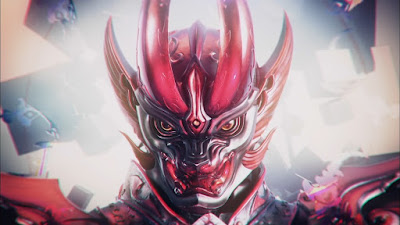Following his defeat at the hands of Horror Progenitor Messiah in the Makai Realm, Jinga is eventually reincarnated as Jinga Mikage – a Makai Knight born into a long line of Makai practitioners. Despite having no memory of his past life and suffering from past trauma after his father was turned into a Horror, Jinga is a capable knight that fights alongside Makai Priest Fusa as the Shining Shadow Knight Roze.
After Jinga is bitten by a Horror on a routine mission, he discovers he has the ability to free people from Horror possession. Suddenly able to save humanity in a way the Makai Order has never been able to before, Jinga sets about putting his miraculous new powers to the test - causing uproar and scepticism in the Makai Order. However Jinga's dark persona still dwells within Jinga Mikage, culminating in an identity crisis where only one version can survive.
Kicking off a series with a reincarnated version of the character with his own established back story is a pretty bold way of doing a Jinga spin-off. Although every GARO series has become with us knowing very little about the man donning the golden armour, immediately Jinga Mikage is met with preconceived notions. As a hero he's far from unlikeable – flawed, empathic and in certain ways more human/relatable than many of the other Makai Knights we've met in the past. Even without the ties to the previous Jinga his background is a big part to the story, with his mother killed by his Horror-possessed father who in turn was eventually slain by Jinga himself. Both the concept and flashbacks are really effective in selling his emotional trauma, as well as his firm and immediately belief that his newfound powers are meant for something greater.
Though the early episodes mostly play like a standard GARO series featuring episodic Horror encounters, it's when Jinga first encounters his dark past that the story really begins to play with the format and character emphasis. Immediately going into the series it was practically a given that Jinga Mikage couldn't run away from himself forever, but the story plays his actions in such a way that it isn't always clear which of his personas is truly in control. As Mikage's behaviour becomes increasingly erratic both from the identity crisis and the potency of his new powers, shock moments become more and more ambiguous. Inoue is pulling double duty as two very different characters sharing the same body and handles it marvellously, fully highlighting why he's not only become such a vital part of GARO but also why he was the perfect man for the job as well.
But though the series greatest strengths lie in the struggle between the two Jingas, it would be wrong to not commend its supporting cast as well. Makai Priest Fusa works as a great partner to Jinga, providing a more supportive role in battle whilst the knight tackles Horrors head on. Her relationship with him becomes a lot more interesting as Jinga’s descent into darkness begins, and the story sells her suspicions and conflictions brilliantly. The pair are also joined by Jinga’s brother Toma, who moves to continue his Makai Knight training out in the field with them. A prominent child character is a new direction for the GARO series and for a first time around they do an excellent job, not just developing a believable character but also an engaging story that runs parallel to the main plot.Traumatised by the events surrounding his parents’ death, Toma enters the series with his memories of that time erased - eventually returning and threatening to turn Toma himself into a Horror. On top of that you also have the various other characters from the Makai Order that come and go within the story, forming a crucial part of mystery and investigation into Jinga’s mental state. Despite this introduction of characters outside the core trio the series, it doesn’t lose that edge it has from (for the most part) being a particularly personal chapter in the GARO story.
Jinga also works so well as a spin-off because of how it subverts the usual GARO morals and expectations. Though it may be a tokusatsu series aimed at an older audience it retains the same core values as all of the other shows its often stacked up against, and is ultimately about good triumphing over evil no matter the odds (the show is about literal knights in shining armour after all). Jinga on the other hand is a completely bleak affair by comparison, and its the villain that’s the one holding all of the appeal. He’s the only character the audience are familiar with going into the show, and thanks to Inoue’s insatiable charm you find yourself not only wanting to see him more and find out what he’s up to, but eventually win so that you know for sure that the character isn’t over and done with yet. This series delivers that on all fronts, and those final few episodes are nothing short of jaw-dropping in comparison what you’d expect from a typical GARO finale.
Fang of God: Jinga is perhaps the most fascinating spin-off in the GARO series yet, offering the same episodic monster action the franchise always does but with a more introspective look at its main character. GARO's key principles of light and hope are cast aside as the show takes a far bleaker turn, allowing Inoue to truly shine in as both the conflicted Jinga Mikage and the hypnotically villainous Horror Jinga. Whether its ending will lead onto anything more is yet to be seen, but something tells me this isn't the last we'll be seeing of Jinga or Amily.














5 comments:
Great review ! I bet the sequel will be a movie.
The series was good concept, and story. However the ending was very bad in my opinion, what's the point of becoming a makai knight in the end you go back to your horror ways. I wish they made the ending a bit better, overall the series i would rate it 4 out of 5 stars....
you clearly didn't pay full attention while watching the series.its clearly jinga wife planned all to bring his horror husband back to life.
Really enjoyed this series, but hated the ending. Really hope they do something with Jinga again to undo it.
Uhh.... the concept to me is good, but execution wise.... yeah, no offense, but this is hands down one of the worst Garo Series. All the characters are idiots, Mikage Jinga's fall is just out of nowhere it makes Anakin Skywalker's arc look good, AND I couldn't even bring myself to care when Horror Jinga won.
Post a Comment